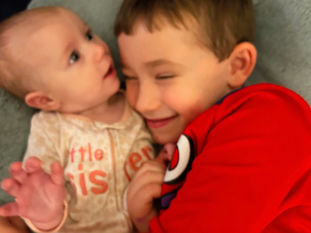
When Our Neurodivergent Kids Struggle to Read Social Cues: Embracing Growth Through Empathy
Jan 3
2 min read
0
3
0
A fellow parent recently shared this heartfelt story:
*“How do I help my son understand that intent doesn’t matter when his words or actions are offensive? He wants to learn Arabic because a classmate speaks it and thinks it’s super cool—great, right? But then he makes random sounds like ‘badablabababa,’ and when I tell him it’s rude, he gets upset, insisting he’s not trying to make fun of it.
It’s so frustrating because I know he’s not being mean, but others may not see it that way. How do I help him navigate this without crushing his self-esteem?”*
When Social Cues Don’t Come Naturally
This story struck a chord because it highlights a common challenge for neurodivergent kids: understanding that intent and impact are two different things.
The behavior this parent describes—making random sounds or blurting out impulsive comments—isn’t rooted in malice. It’s a reflection of how neurodivergent brains process the world: directly, logically, and often without the filters neurotypical people rely on.
Your child isn’t trying to offend anyone; he’s curious, excited, and figuring out his place in the world. The struggle comes when his well-meaning actions unintentionally hurt or upset others—and he doesn’t yet have the tools to process why.
Shifting the Focus: From Shame to Curiosity
Teaching a neurodivergent child that impact matters as much as intent is no small task. Right now, your son’s reaction—his insistence that “I didn’t mean it that way”—isn’t defiance. It’s a protective response.
Instead of focusing on what he’s doing wrong, try redirecting his curiosity. His interest in Arabic is a gift—it’s the perfect opportunity to shift the conversation. Say something like:
“Wow, I love how excited you are to learn Arabic! Let’s find some real words together so you can start practicing for real.”
By channeling his energy into learning, you’re not just addressing the behavior—you’re building on his natural curiosity and helping him express it in a way that aligns with his intent.
Balancing Awareness and Self-Esteem
The hardest part of parenting a neurodivergent child is balancing the need to teach social skills with the need to protect their self-esteem. It’s easy to correct everything, but too much criticism—especially about things they don’t fully understand—can lead to feelings of shame.
Right now, your son doesn’t seem embarrassed by his actions, and that’s a good thing. It means he hasn’t internalized the idea that his quirks make him “less than.”
When addressing his behavior, approach with empathy:
“I know you’re not trying to hurt anyone’s feelings, but sometimes the way things come out can be misunderstood. Let’s talk about how we can make sure people see your awesome intentions.”
This not only validates his feelings but also shows him how to consider others’ perspectives without feeling shamed.
A Final Thought
Social awareness takes time, especially for neurodivergent kids. Your son’s journey won’t look the same as anyone else’s, and that’s okay. The fact that he’s curious, confident, and willing to engage with the world around him is a testament to the strong foundation you’ve built for him.
Keep embracing his quirks, modeling empathy, and creating space for him to learn at his own pace. He’ll get there, and so will you.
With love,
Jamie





